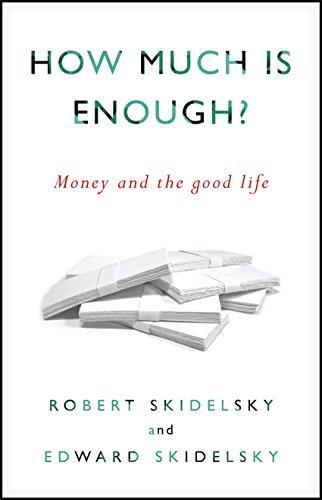Review of 'How Much is Enough?: Money and the good life' by Robert and Edward Skidelsky
3 stars
Interesting book with strong and weak arguments. The chapter on happiness economics confirmed a lot of skepticism I had about being able to measure an emotional state as unclear and culturally-dependent as happiness. I'd add that these measurements are often designed around a Western frame where happiness tends to be defined as the ultimate good (which the authors also are critical of) and would therefore influence the responses people might give in non-trivial ways.
I also liked the authors' definition of their prescriptions as non-coercive paternalism. It puts into words the type of policy that would seem to bring about the most benefit without infringing on individual liberties.
This book also sharpened my frustration with neoliberalism in learning that for all the growth in GDP it brought, it still failed to translate that growth in any way towards access to basic goods. In retrospect, this is a pretty obvious point since I already knew trickle-down didn't work, but I figured that it had to have helped in some way towards the general well-being of the average person.
I think there is something to their argument that we have an acquisitory instinct, and that it is inflamed far beyond any reasonable level by our current iteration of capitalism and advertising. We talk about how important it is to keep growing, and the reason at this point is often a shrug of the shoulders and a "because... we gotta," which seems to be an artifact of a past when we did not yet have plenty. But now we do, and as the authors argue, we are long-overdue in moving our mindset past that of growth as an end in and of itself and towards growth as a byproduct of good policy that prioritizes everyone's needs being met.
This is probably a "no shit" level observation to many but this book also helped me see economics as less of a cold science of money and more of an applied philosophy.
Here's what brings my rating down, though:
1) Some questionable takes on religion and sexual minorities. For a book focused on infusing moral and ethical arguments it seemed pretty ambivalent towards the rights of queer people, treating gay marriage as some frivolous, destabilizing extravagance.
2) A whole chapter spent frothing at the mouth at environmentalists, who they dub "climate radicals," for being alarmist and pushing for governments to adapt for worst case scenarios, which the authors think can be put off until later for when we will surely have better technology to deal with it. This chapter can be skipped and not detract from the rest of the book's coherence.
3) The book has an arrogant tone that at times makes the reader feel spoken down to. There was an eyeroll-worthy segment of them going on about how much more important their work as economists is than others'.
Overall, not bad, but certainly flawed. The first half at times seems to get a little lost in philosophy to the point that you forget you're reading a book about economics, but the second half stays more on topic. I got something out of reading this.

